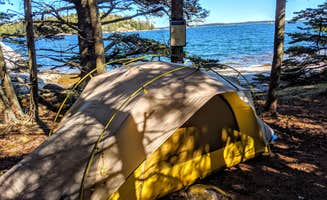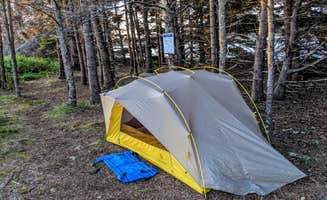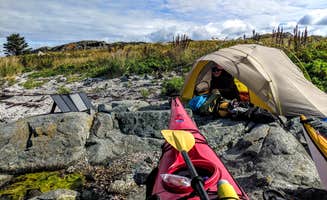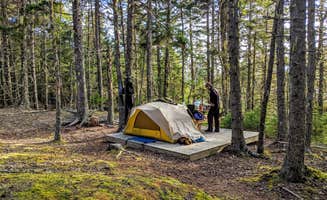Dispersed camping near Rockport, Maine primarily consists of island camping in Penobscot Bay, creating a unique Maine backcountry experience. These primitive campsites require sea kayaks or other watercraft to access, with most islands situated 2-5 miles offshore. The Deer Isle Archipelago camping season typically runs from May through October, with late summer offering warmer water temperatures for paddling but increased likelihood of fog and coastal storms.
What to do
Paddle to secluded beaches: Marshall Island features Sand Cove, a pristine area that serves as an excellent landing site for sea kayakers. According to one visitor, "Sand Cove is perfect for a beach fire and stargazing on a clear night." The island offers multiple hiking trails through conservation land.
Explore nearby islands: From Wheat Island, paddlers can access Isle au Haut, part of Acadia National Park. "Perfect island for exploring the close-by Isle au Haut, a remote section of Acadia National Park, but very hard to get reservations at Duck Harbor Campground," notes one camper. Preparation for variable tide conditions is essential.
Wildlife observation: The archipelago provides opportunities for spotting seabirds, seals, and occasional porpoises. Bring binoculars for better viewing. Early mornings offer the best wildlife viewing conditions, particularly at low tide when shore birds feed.
What campers like
Strategic paddling routes: Doliver Island serves as a key stopover point for multi-day sea kayaking trips. One camper explains it's "a good stop for us on our 9 day journey and a perfect launching spot for crossing Jericho Bay (4.5 miles) to Marshall Island the next day." The island's shell-covered beach provides distinctive landing.
Beginner-friendly options: First-time sea kayak campers often prefer Buckle Island for its accessible shoreline. "This is a perfect island for those new to sea kayak camping as the sandy shore, which is exposed for a good portion of the day, is easy to land on and a short walk to a trail into the woods," reports one visitor.
Natural night skies: The distance from mainland light pollution creates exceptional stargazing conditions. Marshall Island provides "some of the best stargazing spots" according to experienced paddlers, with open beach areas allowing full sky views.
What you should know
Landing challenges: Many islands have tide-dependent access points. One camper warns about Wheat Island: "This can be a tricky island to land on at high tide, so plan accordingly." Researching tide schedules prior to departure is essential.
Insect preparation: Mosquitoes remain active even into early fall. A camper visiting Doliver Island in September reported mosquitoes "were pretty bad all day long." Pack appropriate repellent and protective clothing regardless of season.
Complete self-sufficiency: Free camping near Rockport, Maine requires bringing all supplies. No fresh water exists on these islands for filtering. Waste disposal bags are mandatory as there are no toilet facilities. All trash must be packed out.
Maine Island Trail Association: Membership in MITA provides access to these free camping areas. Campsites operate first-come, first-served with no reservation system. The association publishes detailed guides with landing information.
Tips for camping with families
Site selection priorities: For family groups, Marshall Island offers larger accommodations. "We stayed at one of the 2 sites near Sand Cove which is a truly gorgeous wooded area with a tent platform and a picnic table at each site," notes one visitor. The platforms keep sleeping areas drier.
Weather monitoring: Coastal weather changes rapidly, requiring continuous forecast monitoring. Families should include extra days in planning to accommodate potential weather delays.
Safety equipment: Life jackets are mandatory for all paddlers regardless of swimming ability. Communication devices like marine radios or satellite messengers provide emergency contact options in these remote areas.
Tips from RVers
Mainland staging areas: RVers can use Rockport Harbor as a base while exploring the islands. Store the RV at designated parking areas while undertaking kayak expeditions to access free camping near Rockport, Maine.
Equipment transportation: RVers often face challenges transporting sea kayaks. Roof mounting systems or small trailers provide solutions for carrying boats and camping gear from mainland launching points.
Extended stay combinations: Many visitors combine free dispersed island camping with paid RV campgrounds on the mainland. This approach allows for alternating between primitive and full-service camping experiences during longer stays.





